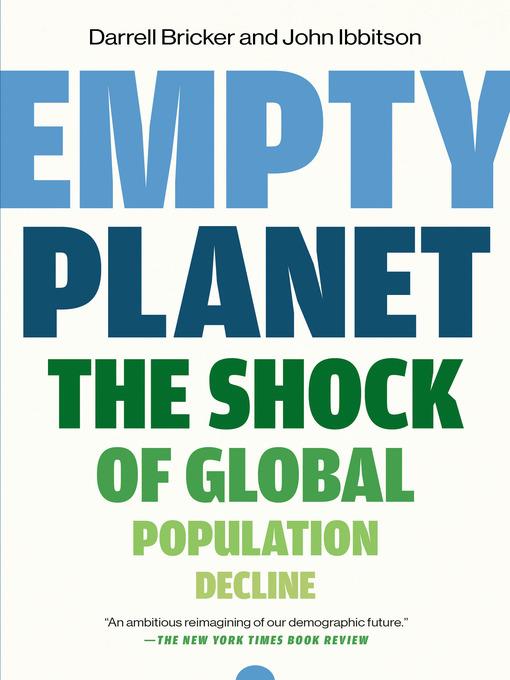
Empty Planet
The Shock of Global Population Decline
کتاب های مرتبط
- اطلاعات
- نقد و بررسی
- دیدگاه کاربران
نقد و بررسی

December 1, 2018
A lively exploration of how "we do not face the challenge of a population bomb but of a population bust--a relentless, generation-after-generation culling of the human herd."Warnings of catastrophic world overpopulation have filled the media since the 1960s, so this expert, well-researched explanation that it's not happening will surprise many readers. Bricker, CEO of Ipsos Public Affairs, and Globe and Mail writer at large Ibbitson (co-authors: The Big Shift: The Seismic Change in Canadian Politics, Business, and Culture, and What It Means for Our Future, 2013) point out that a dozen nations are already shrinking. "By 2050," they write, "the number will have climbed to three dozen. Some of the richest places on earth are shedding people every year: Japan, Korea, Spain, Italy, much of eastern Europe." The authors explain that throughout history, birth and death rates were high, and population grew slowly. After 1800, increased food production and public health improvements lowered death rates, so populations boomed, but this didn't last long. Also after 1800 came the Industrial Revolution and urbanization. Children are a big help on the farm but little use in a city. Perhaps most important, the authors emphasize, when women acquire education and status--something that happens in cities--they have fewer children. As a result, birth rates began dropping along with death rates, and most readers will be surprised to learn that the poor are not exempt. Brazil's fertility is below its replacement rate, and Mexico's is fast approaching. While it's not unanimous, the authors are not alone in concluding that world population, now around 8 billion, will stabilize near 8.5 billion at midcentury and then decline. This is not necessarily good news. Nations losing population suffer labor shortages and an excess of elderly whose support requires taxes from a shrinking number of younger workers. The only effective solution to population decline is immigration, which, all researchers and the authors agree, always benefits their new nation.A delightfully stimulating and not terribly controversial overview of human demographics.
COPYRIGHT(2018) Kirkus Reviews, ALL RIGHTS RESERVED.

February 1, 2019
Contrary to common assumptions about population growth, fueled by a decades-long string of dire warnings stretching back to Paul Ehrlich's The Population Bomb and reinforced by UN predictions, future overpopulation is not a global threat after all. In their latest collaboration. Bricker and Ibbitson (The Big Shift) argue that it's not even happening, presenting a well-documented investigation of social, cultural, and economic realities that undergird declining birth rates and lengthening lifespans. From Europe, Canada, and the United States to emerging economies in Africa and populous countries such as India and China, demographic trends show fertility rates declining owing to urbanization, advances in public health, access to information, the empowerment of women, and weakening of family ties and of the influence of religion. The authors also consider expectations for an uncrowded future world: good for the environment, challenging for individual and national finances, and certainly disruptive. With birth rates falling or poised to decline globally, across economic and cultural conditions, Bricker and Ibbitson maintain that countries most likely to retain population and thrive economically are those most welcoming of immigrants. VERDICT Compelling, convincing, and deserving of a very wide audience, from general readers to policymakers.--Janet Ingraham Dwyer, State Lib. of Ohio, Columbus
Copyright 2019 Library Journal, LLC Used with permission.

December 15, 2018
The popular belief is that the planet's population is constantly growing, pushing Earth toward a tipping point of maximum capacity. In reality, fertility rates are dropping, and life expectancies are rising?two causative factors in what may actually be a steep population decline. Exploring cultural imperatives from Kenya to Korea, social researcher Bricker and journalist Ibbitson delve into myriad conditions and examine the trends that could lead to a prediction that most established and many developing nations will see a reversal of overpopulation patterns. While migrations from Syria to Canada or from Chicago to South Carolina can impact population levels, urbanization and advances in educational opportunities for women can lower birth rates. From China's authoritarian one child policy to the role choice plays in population control, the future health of Mother Earth depends on how such behavioral changes are managed. Thanks to the authors' painstaking fact-finding and cogent analysis, this treatise offers ample and persuasive arguments for a re-evaluation of conventional wisdom.(Reprinted with permission of Booklist, copyright 2018, American Library Association.)

























دیدگاه کاربران